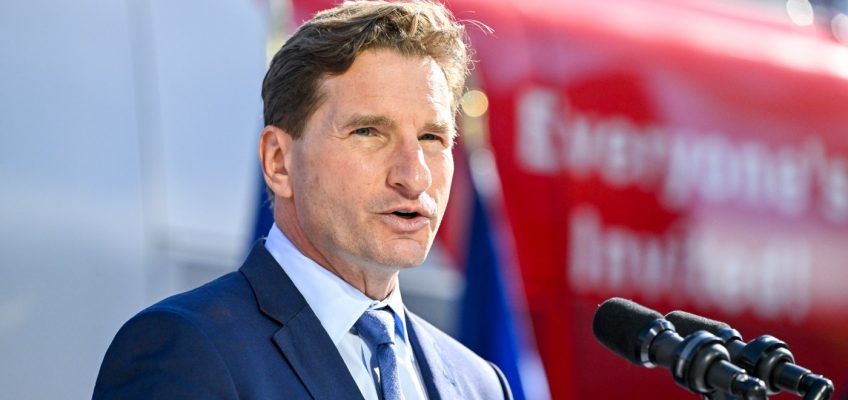The 3M Open has been a career moment — or at least a stabilizer — for a number of struggling players over the years.
It marked journeyman Michael Thompson’s first win in eight years in 2020. Cameron Champ had missed the cut or withdrawn in 10 of his previous 15 events prior to winning at TPC Twin Cities in 2021. Lee Hodges had finished higher than sixth on the PGA Tour just once before he won here last season.
Taylor Pendrith is far from a household name on the PGA Tour. So, at first glance, you might think his story would be a similar one if he captured this week’s title.
That is not the case.
The Canadian leads the 3M Open by two strokes over Matthew NeSmith after carding a bogey-free, 7-under round of 64 in blustery conditions on Friday afternoon to get to 12-under par for the tournament.
It’s just a continuation of strong play for the 33-year-old, who entered the week in 29th in the FedExCup standings. The top 30 at year’s end reach the Tour Championship — a prestigious event reserved for the best of the best.
“I’ve never been there and I’ve been having the best year of my career so far. So, to make it would be awesome. But it’s kind of in the back of my mind,” Pendrith said. “Obviously, I’m in a great position this week through two rounds. So, I’m focused on this week and hopefully some good golf takes care of itself. There’s a lot to play for, for sure, and I know what’s at stake. I’m trying not to think about it that much, but it’s definitely on your mind.”
Pendrith belongs in that kind of company at the moment. Entering the week, he’d already logged five top-10 finishes this season, including a victory at the CJ Cup Byron Nelson in early May.
He’s now made the cut in 10 of his last 11 events, including a fifth-place finish last week at the Barracuda Championship. He ended in a tie for 16th at the U.S. Open in June. If Pendrith can hold on over the weekend to secure his second win of the season, he’d be projected to leap into 13th in the season-long standings.
He’s also in a great spot to earn a spot on the international team for September’s President’s Cup.
Nothing about his performance is a fluke.
“Yeah, game’s in a good spot and I’ve been playing really nicely the first two days here,” Pendrith said, “So, hopefully keep it up.”
Warian’s run ends
Ben Warian needed eagle on No. 18 — his final hole of the day — late on Friday to make the cut. The recent Gophers grad took a lash on his second attempt, hoping to pound the ball over the lake and onto the putting surface. The risky, but necessary, attempt didn’t turn out, as Warian’s shot found water.
Warian noted his lie in the rough for his second shot was “not good.”
“It was one of those where in any other situation it’s a layup, it’s 100% layup,” he said. “I took hybrid there, opened the face wide open just to try to give myself, first of all enough metal to get through the rough, and to try to get enough loft to get it high enough, but it was too bad of a lie.”
Warian ended up carding a bogey on the hole and a 3-over round of 74 for the day to finish the tournament at 1-over.
Playing on a sponsor’s exemption, he started the day at 2-under par after a strong opening round. But he started slowly in the wind on Friday. Warian tallied a pair of bogeys with no birdies on his front nine, and then trouble off the tee led to a double bogey on No. 11 to drop the Hill-Murray alum to 2-over for the tournament.
Warian entered the week knowing his driver was his weak spot, and that proved true through two rounds. He is fifth in the field in strokes gained putting, but couldn’t put enough together from tee to green to contend.
“I feel like inside 150 yards, I can compete with anybody out here, I really do, and I think my stats will prove that this week,” he said. “I’ve just got to get off the tee a lot better.”
To Warian’s credit, he battled back with birdies on No. 12 and No. 15 to get back to even par, giving himself a chance to climb up to the cut line of 2-under par.
“Just got to keep fighting, that’s all you do, you have to keep fighting no matter what,” Warian said. “I think that’s when you really can learn a lot about yourself and about who you truly are, kind of when your back’s against the wall.”
The Stillwater native will maintain his amateur status through the summer and into the fall. He has a number of key amateur events still to play — including the Western Amateur next week and then the U.S. Amateur at Hazeltine next month. Strong finishes could potentially secure Warian a card on the DP World Tour next season through the Global Pathway.
“I’ve got to put the pedal to the metal,” Warian said.
Related Articles
3M Open: Illness forces Billy Horschel to withdraw prior to Round 1 tee time
3M Open: Stillwater’s Ben Warian dazzles en route to 69 in Round 1 of PGA Tour debut
3M Open: Gophers alum Erik van Rooyen wouldn’t miss out on trip back to Minnesota
For many players whose futures are in peril, 3M Open is another crack at cementing PGA Tour status
Stillwater native Ben Warian enters 3M Open week with many obligations, but one primary goal: Win




